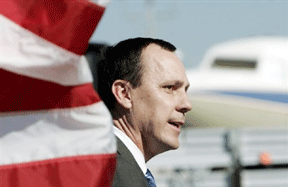On the Seventh Anniversary of 9/11,
|
| Did You Know?
While a midshipman at the U.S. Naval Academy, Sturgell earned an associate of arts degree in accounting from Anne Arundel Community College. “I didn’t quite pass the CPA exam,” Sturgell said. “But it’s been useful having the financial management background as I deal with 46,000 people and $24 billion a year.” |
Bay Weekly Seven years in from 9/11, are we more or less vulnerable to terrorists?
Bobby Sturgell I don’t think it’s any secret terrorists are still out there and continue to view aviation as a means of destruction, just as they did seven years ago.
I think both Congress and the administration have done a lot to keep us safe from terrorists. Screening is much more thorough. The focus is on risk. All the agencies involved in intelligence are much more coordinated.
Bay Weekly What has that greater security cost us in terms of civil liberties and civilian convenience — down to shoeless security checks?
Bobby Sturgell It’s certainly made things different for the individual passenger. Every time I take my shoes off reminds me of 9/11 and what people did to this county and continue to try to do. For me it’s a small price to pay to prevent another attack.
Bay Weekly A small price, but an accumulating one. Are there people in the FAA whose job it is to think from the passenger’s point of view to find ways to alleviate the increasing burden?
Bobby Sturgell The Transportation Security Administration [a separate federal agency] has people looking at security and certainly at ways to maintain the level and still improve passenger experience, just like the airports and carriers are trying to do.
I think some of the inconvenience is being worked out with technology and the way we move people through the security system. And this month at JFK airport in New York, Jet Blue opened the first new terminal since 9/11, designed with security needs of today in mind.
Our agency focus is more on efficiency, safety.
Bay Weekly I’ve heard it argued it will take an Act of Congress to regulate airline schedules and congestion. Is that so?
Bobby Sturgell We have fairly broad authority to control the airspace, and at a few airports we have found it necessary to do that with scheduling restrictions on airlines. For instance, the chronic delays at JFK airport in New York last summer. We’ve taken steps to reduce the long delays.
Airports can only handle so many operations per hour. In some hours, JFK far exceeded what they could handle. That’s the No. 1 [air] market in the U.S.
Bay Weekly You’re putting a cap on congestion, but the pressure that pushes congestion is still there.
Bobby Sturgell I think one of the great challenges for this country will be its aviation infrastructure from here forward. By and large, we have older airports that have become landlocked with growth so they have no room to spread out.
Since 2000, 13 new runways have been built, with three more coming in November. We need not only new runways but also new airports with new designs, like Atlanta and Dallas-Fort Worth, which are bigger and spread out with parallel runways, which eliminates intersecting planes.
Airports are huge economic engines for their cities, and they bring huge political fights. It’s not our job building runways. We support them and can tell where we see problems, but building is largely controlled by states, cities and airport authorities.
More air traffic brings problems, as well, and not just noise issues, but emissions issues.
Bay Weekly So global warming is a safety issue you worry about?
Bobby Sturgell Absolutely. Aviation is responsible for about two percent of emissions today. In the last half-dozen years, we’ve reduced emissions while moving more people and cargo.
Planes are getting more efficient. With fuel now 40 percent of airlines’ cost structure, nobody has more incentive to reduce fuel, hence emissions, than airlines. We support research and development of new engine technologies, alternative fuels and flight procedures.
For example, by transitioning to a system based on GPS navigational capabilities, a pilot can be much more accurate. That in turn helps us reduce fuel burned and emissions.
Bay Weekly So at the bottom line, how safe on September 11, 2008, are we from failures of the system — of equipment, maintenance, congested airspace, regulation?
Bobby Sturgell The International Civil Aviation Organization just did a comprehensive safety audit of every country. We got a score of 91 percent. The average was 56 percent. We run the biggest system in world; considering its size and complexity, 91 is very, very good.
Here’s another measure. Just today, I announced results of a safety audit: We reviewed over 5,600 airworthiness directives, and we found the airlines in compliance 98 percent of the time. I would challenge any regulatory agency to come up with that result.
And that’s one piece of a very redundant system. We have now moved over 1.5 billion people without a fatal commercial accident. It’s been two years. It’s not a perfect system, but it’s a very, very safe system.
Bay Weekly This time of year also brings us another threat to keep your phones ringing: hurricanes.
Bobby Sturgell We’re a 24-7, 365-day operation. I’m extremely proud of this agency’s response last week for example. At New Orleans airport, we were the last people out and the first in. We were back up and operating within 24 hours.
I think what people don’t understand is the large number of technicians out there in remote navigational facilities making sure emergency generators are fueled and operating, battery backups working in case sites are shut down.
Our controllers are there, in many cases having to send their families out a day or two ahead, and staying to serve the public, then coming back as soon as the airport opens.
Bay Weekly You’ve been acting administrator for almost a year.
Bobby Sturgell September 13 will be a year.
Bay Weekly Is the Senate slow to advise and consent on your appointment when a new administration is months away? Or is it because you have enemies out there? Beyond the insults — and the Web is crawling with insults to Bobby Sturgell — seems to be the accusation that you’ve allowed the airlines to self-regulate, leading to inconvenience, danger and chaos in the skies.
Bobby Sturgell Ask Congress. It’s disappointing that the confirmation process is playing out the way it is. The only thing they’ve said that is holding up the nomination is airspace redesign, and the General Accounting Office just came out with a report validating what we’ve done in New York.
Congress put in place a five-year term for the agency administrator for just the place I am today: transition between administrations. [Continuity] is extremely vital for an operational agency that affects people every day. Two million people fly every day.
I think it’s all about politics. Nobody has questioned my qualifications, that’s for sure.
Bay Weekly In a life where you’ve never lacked something interesting to do, what might you do next if you don’t get your appointment?
Bobby Sturgell One of my shortcomings is I was never one to plan for a 30-year career in a company. I’ve taken advantage of many opportunities. I came into government like many people after 9/11 to help, and I’m very fortunate to end up where I am now. There’s no better place for a pilot to be than head of this agency. I don’t know how you find something more interesting than this.
So I’ve been focusing day to day on running and improving the system.
Still, I certainly miss being around Anne Arundel and Calvert. It’s nice to be more involved, which I hope to do sometime, somehow. Now, I don’t know what that looks like.
Bay Weekly When you come home from work, you’re best known as the son of Barbara Sturgell, 20-year proprietor of Happy Harbor in Deale. Your mother’s just sold Happy Harbor. How are you and your family taking that big change?
Bobby Sturgell She owned Happy Harbor for 20 years and worked there much longer. My first jobs were mopping floors at the old Deale pharmacy and washing dishes at Happy Harbor. It’s been part of the family for many years. We all miss it and hope it stays the landmark it has become.


